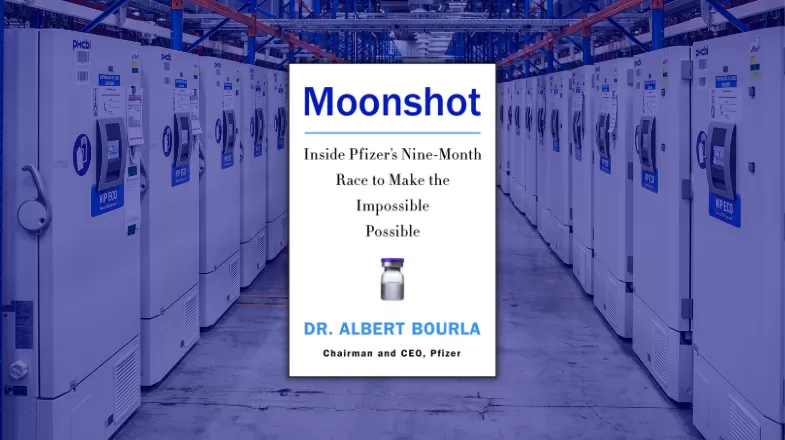Articles
Featured Articles
Read our latest stories on the people and scientific innovations making a difference in patients’ lives.

Purpose & Ideals
The Meaning of Moonshot: Lessons in Leadership to Last a Lifetime
ON TUESDAY, DECEMBER 31, 2019, Chinese authorities alerted the World Health Organization to a mysterious virus causing pneumonia-like illness in a small cluster of patients in the city of Wuhan. Shortly after, the novel virus was identified as SARS-CoV-2. Less than a year later, on Tuesday, December 8, 2020, nearly ninety-one-year-old Margaret Keenan received a Pfizer/BioNTech COVID-19 vaccine shot at England’s Coventry University Hospital and became the first person in the world to be...

Purpose & Ideals
Net Zero by 2040: How Pfizer is Fighting Climate Change with Ambitious Science Based Goals
In 2015, on the eve of the Paris Agreement, Pfizer was one of the first companies in the world to seek and gain approval of its greenhouse gas emission reduction goal from the Science Based Targets Initiative (SBTi). Since then, leading scientific researchers, together with coalitions such as SBTi, have urged the private and public sectors to increase their commitments to address the growing urgency of the climate crisis. The science is irrefutable; action is required to meet the goals of the Pa...

Purpose & Ideals
How The Pfizer Foundation is Partnering to Improve Health Outcomes for Black Youth
A conversation with Dr. Clyde Glenn, President of the Essie B. & William Earl Glenn Foundation for Better Living In Sunflower County, Mississippi, one of the poorest counties in the nation, The Pfizer Foundation partners at The Glenn Family Foundation (GFF) are working to improve health and life outcomes by addressing the social determinants of health impacting this community. As defined by the Centers for Disease Control and Prevention, social determinants of health are conditions in the...

Purpose & Ideals
Why Medicine Flavor Matters in Drug Design, Especially for Kids
Medicines don’t work unless people take them. It sounds like an obvious statement. And yet, a large percentage of people—up to 50%1 even—struggle when it comes to swallowing medications. Medicine flavoring has been a big part of the problem. For more than a decade, Jeremy Bartlett, Ph.D., a Research Fellow with Pfizer Drug Product Design in Groton, Connecticut, has been working to solve that problem. “We work in pharmaceutical sciences, and if we develop a medicine you’re supposed to take and...

Purpose & Ideals
Pfizer’s Institute of Translational Equitable Medicine Addresses Equity in Health Research
When it comes to healthcare, the terms “equitable” and "access" often go hand-in-hand. In order to prevent, treat, and identify diseases that disproportionately impact underserved and minority populations, Pfizer believes that research must be directed to the root causes of healthcare disparities. The recently-launched Institute of Translational Equitable Medicine (ITEM) is intended to do just that: work toward a more equitable future of health care. For Aida Habtezion, M.D., who is Pfizer’s...

Purpose & Ideals
Pfizer's Commitment to Supplier Diversity
While it’s easy to recognize the economic and social benefits that suppliers and their communities receive by doing business with a global biopharmaceutical company such as Pfizer, the benefits are far more mutual than they may seem. Applying innovative perspectives gained from working with suppliers that bring diversity, Pfizer is better able to improve patient care through these connections to a more inclusive group of communities, thus improving health for all. One way Pfizer has worked to...

Purpose & Ideals
Through Public-Private Partnership, Scientists are Working to Better Understand Gene Therapy and How it Could Help Patients With Rare Diseases
A rare disease is, by its very nature, rare. The CDC defines a rare disease as a condition that affects fewer than 200,000 people in the United States, or no more than one out of every 2,000 people in Europe.1 And yet, rare diseases—which frequently have a genetic component—affect many: there may be as many 7,000 different types of rare diseases, impacting 25 to 30 million people in the United States, according to the National Center for Advancing Translational Sciences.2 Often, rare diseases...

Purpose & Ideals
Aiming for Equity: Assessing Pfizer's Ongoing Commitment to Diversity and Inclusion
As one of the world’s most prominent biopharmaceutical companies, Pfizer recognizes a responsibility, not just to pioneering medical and scientific breakthroughs, but also to building teams of scientists, doctors, and professionals that represent and model a diverse workforce. In 2020, Pfizer CEO Albert Bourla laid out a series of goals to demonstrate the company’s dedication to Equity, one of Pfizer’s four core values, by increasing diversity and inclusion. These goals focus on improving...

Purpose & Ideals
Collaborative Efforts in Biopharma: Accelerating Vaccine Development
In the year since the pandemic struck, the world has watched one of the greatest real-life dramas of all time unfold: the quest for a vaccine. In the past, drug development and clinical trials were of interest to a relatively small group of scientists, regulators and health care professionals. But with the threat of COVID-19 looming large, time has not been a luxury. The race for a vaccine has become a true spectacle, carrying with it the potential to save untold numbers of lives, globally.The...

Purpose & Ideals
Doing Better: Increasing Diversity in Clinical Trials
Diversity in clinical trials is key to equitable health outcomes. Increasingly, clinicians, researchers and patients are realizing that a lack of diversity in clinical trial participants may contribute to the stubborn persistence of health disparities, such as the fact that Black Americans are 30% more likely than whites to die prematurely of heart disease.1 After all, if a clinical trial for a new nonalcoholic steatohepatitis (NASH) drug doesn’t include an adequate number of Black participants...

Purpose & Ideals
Improving Metastatic Breast Cancer Care for Underserved Populations
Globally, breast cancer continues to be the most common invasive cancer in women, and one of the most common forms of cancer overall.1 While significant advances have been achieved, especially in metastatic disease, challenges beyond treatments remain, especially disparities created by structural, socioeconomic, socio-environmental, and biological factors. A recent 2021 publication reveals both the challenges facing underserved patient populations with metastatic breast cancer (mBC) in Europe...

Purpose & Ideals
Partnering for Sustainable Solutions: Combatting the Deadly Threat of Antimicrobial Resistance
Antimicrobial resistance (AMR) is a leading global public health challenge that affects everyone, everywhere.[i] Although antibiotics are among the most important medicines the world has ever known, many are becoming ineffective as bacteria continue to evolve and become resistant.[ii] The growing risk of AMR means that in the near future doctors may no longer be able to rely on antibiotics to treat many basic infections.[iii] The threat of AMR disproportionally affects marginalized populations...
Media Resources & Contact Information
Anyone may view our press releases, press statements, and press kits. However, to ensure that customers, investors, and others receive the appropriate attention, Pfizer Media Contacts may only respond to calls and emails from professional journalists.
